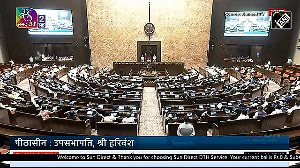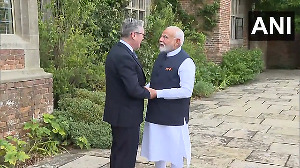In all my years of teaching parenting, I have realised that television viewing is a source of major concern for all parents. "My child watches too much TV and I don't know what to do" is a wail I hear very often. Most children today are so used to television that life without it is unimaginable for them. And with the number of channels available today, they have a wide variety of programmes to choose from.
However, for parents, this is where the advantage comes in. Television in moderation can be a good thing and having a wide choice of good programmes to watch helps even more.
Television does have its good effects. It can be educational. There are programmes which teach preschoolers alphabets and numbers, children can learn about animals and plants on nature shows, creative learning takes place during art shows and so on. Television is also a source of entertainment and laughter. Comedies, quiz programmes and music shows make for family time spent together wherein everyone is discussing and enjoying the show.
However, too much television or the wrong type of show can have a negative effect. Research shows that kids who watch TV for four hours or more every day are more likely to be overweight. When kids watch too much TV, it also eats into their time for outdoor play, reading, activities like art and craft and social interaction, thereby affecting their social development, creativity and language skills. Moreover, watching programmes that depict violence can lead to aggressive behaviour in children. It teaches them that violence is an acceptable way of dealing with problems. It can also develop fear in a child and make him/ her believe that the world is scary and something bad will happen to them too. Children can't always distinguish between reality and make-believe.
Parents can step in and inculcate good television habits in their kids. Here are a few pointers:
~ Discuss and enforce certain rules. Set a limit on the number of TV-watching hours, (one to two hours per day should be the upper limit), no TV during meals, while doing homework etc.
~ Be a good role model. Be aware of the amount of time you spend in front of the TV and the kind of programmes you watch when the kids are around.
~ Be aware of the kind of programmes your children watch. Preview the programme before your child watches it so you know the content.
~ Watch TV with your child. You may not want to sit through the entire programme, but this will help you to assess the tone and the quality of the show (violence, bad language etc). This is even more important when your child is watching a new show you haven't heard of at all.
~ Talk to your child about what he or she sees on television. Discuss programmes with your children. With younger kids, they may tell you the story or what they learned from a value-based cartoon, or about animals and plants from nature shows etc. With older children, you could discuss questions while watching quiz shows together or preferences on a song or dance competition. Tell your children when some act on TV is not appropriate. For example, when a child talks rudely to a parent on a cartoon show, tell the child you did not like the way he spoke and ask your child, "What did you think about it? Do you think there is a better way he could have made that statement?" Explain to your kids that programmes that glorify violence, cultural differences etc. are against your values. This is a good platform to discuss your views and values.
~ Keep the TV guide handy. Watch out for kid-friendly, educational and/ or family programmes. This will keep both you and your children happy. They will get their quota of watching TV and you will be happy they have watched something that doesn't harm them. In fact good programmes can spark interest in different activities, lead to interesting discussions and enhance your child's development.
~ Offer fun alternatives to television. If the kids are watching television all the time, help them find different options. Encourage them to read, play board games, perform, outdoor activities, pursue art and craft etc. Spend some time with them when they are engaged in these activities and make it a fun time for both of you.
~ Make children aware of the ill effects of television. Inform them that watching violent programmes can lead to aggressive behaviour, it takes away time from other activities and gives them less time to spend with friends and family. For older kids, be on the lookout for any articles also that explain the bad effects of television.
Keep in mind that television in moderation can be beneficial as long as you are able to monitor the kind of programmes being watched.
Rupal Patel has done her child psychology from the National School of Health and Sciences, London. She also holds a diploma in early child care and education ORT India and Oxford. Rupal has been holding workshops for parents for the last five years.






